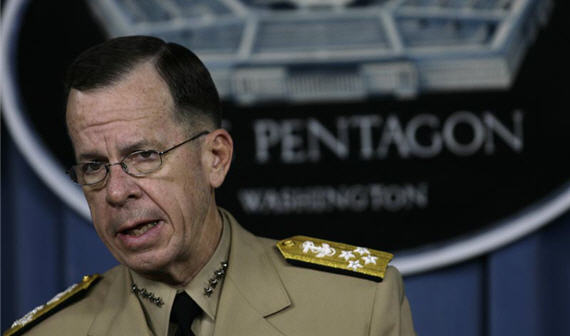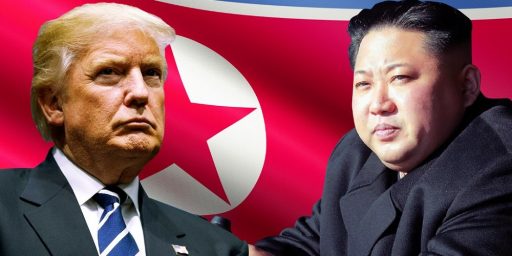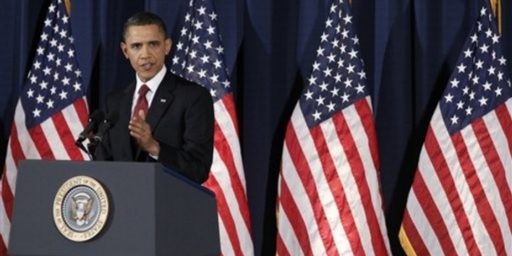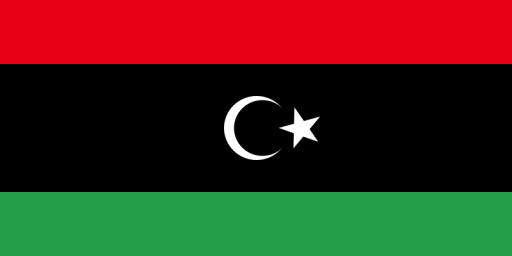Obama vs. Pentagon on Libya
The Pentagon is frustrated that the Obama administration doesn't "seem to understand what military force can and cannot do."
HuffPo’s David Wood begins a post titled “Obama White House, Pentagon At Odds Over Libya Policy” with this:
After 26 months in office, President Obama still has not forged a smoothly working national security team that can both nimbly pounce on military crises and deftly manage festering problems, say current and former U.S. officials.
As in previous administrations, much of the problem lies in the friction between civilians working in the White House and military officers and Defense Department civilians working across the Potomac River in the Pentagon. Senior officials describe the predicament as a “culture clash.” The miscommunications and misunderstandings between the groups cause frustration and anger, which sometimes even leads to policy paralysis, officials say.
I can’t speak to whether the Obama administration has particularly bad working relations with the military brass, although I haven’t seen any evidence of it. But Wood’s report really points to something else: the disconnect between the domestic politics of foreign policy and its realities.
One recent example of this dynamic at work is the Obama administration’s tentative, half-way intervention in the Libyan uprising.
“It’s a mess,” lamented a senior U.S. official. Washington took the bold step of committing military force, but not enough to win. The administration waited to apply very limited military force until it was almost too late, and now, the official says, it has painted the U.S. “into a corner.” In the resulting stalemate, Libyan rebels and civilians are being ruthlessly pursued and killed while the United States, in effect, stands helplessly by.
The White House wanted the Pentagon to come up with a low-cost regime-change plan for Libya. Ideally, this strategy would have toppled Col. Muammar Gaddafi without bogging the U.S. down in another inconclusive foreign adventure. And by no means could the plan have included young American infantrymen advancing under fire across the sand.
The military kept insisting that no such option existed. A real regime-change operation, some officers argued, requires “boots on the ground.” That was a cost the White House, given rising domestic pressure to bring the troops home from Afghanistan and Iraq, was unwilling to consider.
In long meetings and email exchanges, arguments over strategic details often led to more serious disagreements, the official told The Huffington Post. The White House thought the Pentagon was disrespecting the president by refusing to propose a politically acceptable action plan, while the Pentagon became furious that White House officials didn’t “seem to understand what military force can and cannot do,” the official said.
Military analysts warn that simmering disputes like this could adversely affect the missions in Libya and elsewhere.
“I worry the [White House] civilians will interfere and mess up” the clear-cut military operation in Libya, said Duke University Professor Peter Feaver, who managed Iraq War policy in the Bush White House from 2005 to 2007. But, he added, “I worry that the military will do what it wants and ignore the political guidance from the top. The truth is,” he told The Huffington Post, “both bad things could and have happened in the past.”
This isn’t really a story about civil-military relations in the classic sense. The military’s leadership isn’t questioning the right of their civilian bosses to issue orders. Rather, there’s a mutual frustration at work. The administration has a set of foreign policy goals that can be achieved by military force but domestic considerations are limiting the type and amount of force it is willing to commit. The military leaders understand that intuitively and are insisting on either lowering the goals to those achievable by military force or eliminating the caveats in order that they might achieve the goals. Eventually, as I argued yesterday, the administration will have to do one or the other.
Via NATOSource







It’s not just domestic concerns. There would be a very negative reaction in much of the Arab world if the US were to deploy ground troops in Libya, and even the Rebels themselves said it was unacceptable. The last thing we need to do is to change the narrative of the Libyan Civil War into Yet Another American Invasion of an Arab Country.
That doesn’t surprise me. Bob Woodward’s Obama’s War said something similar, with Obama constantly complaining about how the military wasn’t giving him the “option” he wanted.
“The administration has a set of foreign policy goals that can be achieved by military force but domestic considerations are limiting the type and amount of force it is willing to commit. ”
There are quite a few options available to Obama in Libya that doesn’t involve asking the hapless US military to do anything:
1. Give the Libyan rebels better arms
2. Bribe Qaddafi’s forces to defect
3. Get the British and French to step up their operations
4. Hire mercenaries to aid the rebels
5. Bribe another African power to come in on the side of the rebels
etc., etc., etc.
These things were considerably more complicated during the Cold War when the Soviets were activly opposeing the US in Africa.
If the rebels can’t run a rebellion on their own, what makes anyone think they can run the country after Qaddafi is gone?
And those civilians in the media are all the more enlightened. 🙂
Comparing Iraq to Libya is like comparing a 9M earthquake to a 3M earthquake: the scales are way different.
And Ponce’s “etc.” means, “huh?” How about belling the cat, Ponce? Why don’t we just bell the cat? No prob!
In fact, I think that Obama will do nothing else, certainly nothing significant, in Libya. He’s done with it, as his early, repeated statements have made clear. His committal of US forces there was only symbolic anyway. He never had a plan to do anything in Libya. Besides, his only real objective was accomplished on the very first day. Libya is now a big, fat zero to him except as it relates to his perception of November 2012.
“Why don’t we just bell the cat?”
Kids today.
No idea how easy they’ve go it.
It’s not like we suddenly discovered 30,000 Cuban troops had arrived to prop up the government, like we did in Angola.
I think we’re seeing the parasitic structures, like the press, think tanks, international organizations, etc., that will have to be dismantled before we can cut the US military down to a reasonable size.
That uniform is a throwback to the navy of the 1940’s. So much nicer than what I had as an officer. Anyone know if this is soon-to-be the new look?
These fights between different branches of government are all to frequently the main cause of their numerous failures. There is a joke about this saying that Secretaries of State and Defense automatically dislike each other until they are united in their dislike of the National Security Advisor.
@Ben Wolf: Mullen introduced it when he was CNO and it’s been in a “testing”phase since 2008. It’ll ultimately replace the service khakis, dress blues, and formal whites.
Almost anything looks nicer with four stars on it.